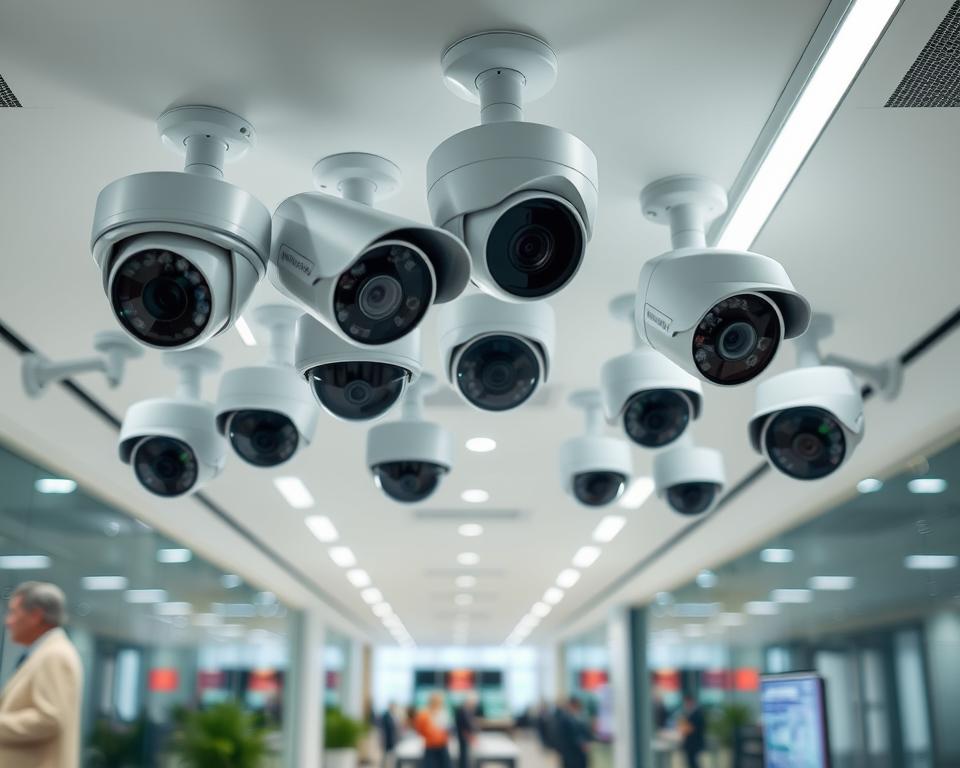Improving Safety via Hospital Security Guards
Can you imagine that hospitals deal with around 30 violent incidents per day? This shocking statistic underscores the crucial function of Hospital Security Guards. They defend patients, team members, and sensitive records alike. Within the ever-changing healthcare environment, effective Healthcare Facility Security is critical. It involves establishing secure environments where patients receive care free from violence or privacy risks.
Collaborating with established experts such as Divine Protection Services strengthens Medical Center Security Services. This ensures security stays front and center without limiting accessibility. This piece explores how commercial property patrol solutions and monitoring systems can greatly enhance safety measures. It covers threats from within and beyond effectively.

Central Ideas
- Hospital Security Guards are essential for safeguarding patients, personnel, and confidential information.
- Healthcare Facility Security is vital to reduce violent episodes and protect privacy.
- Integrated security systems enhance the overall effectiveness of medical center security services.
- Partnering with companies such as Divine Protection Services delivers personalized security strategies.
- State-of-the-art technologies are the foundation of present-day healthcare security solutions.
- Managing openness and privacy is crucial for efficient hospital security standards.
The Importance of Hospital Security
Hospital security is vital for protecting patients, employees, and private information. The escalation of violence in medical environments points to the importance of vigilant Hospital Security Guards. These officers are indispensable for preserving a secure setting and protecting everyone’s rights and dignity.
Executing strong Healthcare Facility Security approaches is essential to avoid aggression. This supports the creation of a compassionate space, elevating the patient and family experience. It moreover confirms compliance with standards like HIPAA, mandating secure access management to defend Protected Health Information (PHI). These actions not only defend patients but also nurture trust between healthcare teams and their communities.
| Type of Security Measure | Value | Adherence to Rules |
|---|---|---|
| Access Control Systems | Block unauthorized access and entry | Essential for HIPAA compliance |
| Surveillance Cameras | Oversee actions and discourage wrongdoing | Supports regulatory requirements for safety |
| Emergency Response Plans | Enable swift reaction to emergencies | Compliant with safety and emergency management guidelines |
| Training for Security Personnel | Train employees in crisis response skills | Ensures compliance with safety standards |
Allocating resources to strong security protocols and personnel training is vital for safeguarding hospitals and health facilities. These frameworks establish a secure, compliant environment, fundamental for delivering quality care to patients.
Function of Hospital Security Guards
Hospital security personnel perform a critical role in safeguarding hospitals. They monitor access points to stop unauthorized entry, handle emergencies, and use conflict resolution to prevent threats. Equipped by Divine Protection Services training, they identify and address early indicators of agitation or hostility.
Their presence is fundamental to maintaining the health and security of patients and staff. They protect the hospital’s operations, essential for a healing environment. By maintaining safety, they enhance the patient experience and minimize hazards.
High-Tech Tools for Hospital Security
Contemporary hospitals are turning to Advanced Technologies to strengthen their protection systems. Medical Center Security Services adeptly incorporate AI-powered cameras to elevate monitoring efficiency. These cameras offer real-time tracking and analysis, enabling staff to identify and respond to threats swiftly.
A principal component of Healthcare Security Solutions is implementing access control systems. These solutions confine entry to restricted areas, ensuring that only sanctioned personnel can access crucial sections. Through biometric authentication, healthcare facilities can introduce an additional security tier for patient records and critical medical devices.
AI security solutions play a critical role in physical security. Facial scanning and conduct detection help security staff to act swiftly on security violations. Enhanced video analytics underpin strategic decisions, ensuring uninterrupted surveillance of medical facilities. This cultivates a secure space for personnel and patients.
| Innovation | Application | Benefits |
|---|---|---|
| AI-driven Surveillance | Real-time monitoring | Rapid hazard recognition |
| Access Control Systems | Regulated entry | Securing critical zones |
| Facial Recognition | Biometric verification | Preventing unauthorized access |
| Video Analytics | Operational oversight | Data-driven decision-making |
Advanced Technologies not only protect hospital assets but also contribute to creating a safe environment for all. By allocating resources to these innovative tools, medical centers can stay alert to security risks. This secures quality care delivery for patients.
Healthcare Security Methods
Solid Healthcare Facility Security frameworks are crucial for defending patients, staff, and visitors in healthcare centers. Carrying out in-depth risk reviews is the bedrock of these methods. By pinpointing weaknesses, hospitals can develop tailored protocols for diverse situations. This improves their readiness for whatever incidents may arise.
It’s important to foster the reporting of abnormal behaviors and threats. Healthcare facilities must have systems ready to respond quickly to such reports. This proactive stance in Healthcare Facility Security creates a culture where everyone contributes to safety.
Overseeing guest access is a vital part of Medical Center Security Services. Making sure that only permitted persons gain entry preserves a safe setting. Watching over patient-caregiver interactions helps diminish risks. This ensures a safer environment for everyone. Here is a table summarizing essential parts of robust security strategies.
| Security Module | Description | Advantages |
|---|---|---|
| Risk Assessments | Spotting weaknesses and evaluating potential hazards. | Increases readiness and reaction effectiveness. |
| Incident Reporting | Prompting stakeholders to report odd conduct. | Enables swift threat responses and heightens vigilance. |
| Visitor Management | Procedures for overseeing and regulating facility entry. | Fortifies security and lessens unapproved entry. |
| Staff Training | Offering safety training to staff members. | Enables personnel to manage security events adeptly. |
Educating Security Staff Properly
Effective training for healthcare security personnel is key to maintaining safety in hospitals. Continuous education helps staff adapt to new challenges. It also boosts their ability to respond well in different situations.
Divine Protection Services highlights nurturing excellent situational awareness in security officers. This includes learning conflict management skills for high-stress interactions. Frequent drills and mock scenarios strengthen procedures. Personnel gain the ability to handle risks swiftly while maintaining respect and dignity.
This approach to training security personnel goes beyond defensive practices. It encourages a climate of safety and professionalism across healthcare facilities. By focusing on core competencies, hospitals ensure their security teams can handle challenges effectively.
Conforming to Regulatory Criteria
Adhering to Regulatory Standards is critical for medical centers striving for safety and credibility. HIPAA, for instance, requires secure access controls to protect Patient Health Information (PHI). Such measures block illicit entry and prevent data breaches.
Hospitals can strengthen their compliance by instituting detailed protocols. These include regular audits, staff training, and clear incident reporting processes. These steps not only ensure patient well-being but also foster community confidence.
Firms such as Divine Protection Services deliver custom compliance plans for healthcare institutions. Their proficiency in Hospital Security Services assures that security personnel are able to satisfy regulatory demands.
Commitment to compliance reduces risks and builds a strong patient-provider relationship. A proactive view on regulations aids the entire healthcare infrastructure.
Hospital Security Guards at Work
Hospital Security Guards are crucial for protecting medical environments. Their duties are evident in various real-world instances, demonstrating a forward-thinking approach. For example, they manage conflicts in waiting areas, resolving them quickly to prevent violence.
When tensions rise, these guards move people to safe locations, helping them during emergencies. This action not only safeguards those in distress but also helps maintain a calm atmosphere. Their collaboration with authorities during critical events spotlights the role of Professional Healthcare Security. They frequently act as initial responders.
The training from Divine Protection Services prepares these guards to handle emergencies well. They acquire skills to uphold policies while maintaining respect for all. This mix of command and empathy positions them as essential parts of the healthcare team. They commit to ensuring security and protection for everyone on site.
Adapting Security Solutions for Hospitals
Healthcare institutions confront distinct security hurdles that necessitate a personalized approach. Tailoring Security Solutions is essential for confronting these matters, ensuring safety for both patients and staff. Partnering with professionals like Divine Protection Services lets hospitals design security programs suited to their unique demands.
A holistic security strategy encompasses vital domains like violence avoidance and pharmacy protection. With state-of-the-art technologies, hospitals can strengthen safety protocols while remaining HIPAA-compliant. This usually entails visitor management platforms and dynamic access control solutions that adjust to evolving demands.
The role of Medical Facility Guards is also vital. They obtain focused instruction to manage security situations and uphold constant awareness. Their presence fends off risks and comforts both staff and patients.
The following table demonstrates how Personalizing Security Solutions tackles diverse healthcare issues:
| Issue | Custom Solution |
|---|---|
| Violence Prevention | Coaching Medical Facility Guards in calming and negotiation tactics |
| Medication Security | Installation of secure medication storage and monitoring systems |
| Visitor Management | High-level visitor vetting and credential issuance procedures |
| Access Control | Flexible access control platforms that adapt to operational demands |
By carefully planning and partnering with the right organizations, healthcare facilities can establish a strong security posture. This comes from Personalizing Security Solutions to fit their individual needs. Uniting careful human monitoring with tech solutions substantially bolsters security, creating a safer, more effective healthcare space.
To Conclude
Safeguarding the security and welfare of patients, staff, and private information is fundamental in healthcare settings. Hospital Security Guards now use advanced technologies and training to combat modern threats. This evolution not only secures physical spaces but also fosters trust among patients and healthcare providers.
Adapted Healthcare Security Solutions assist hospitals in remaining at the forefront of the changing security scene. Collaborating with seasoned organizations such as Divine Protection Services arms healthcare centers to manage safety challenges proficiently. By blending personnel training with cutting-edge technology, hospitals can foster a secure environment for healing and care.
The health sector grapples with escalating risks, making professional security steps vital. Hospitals must adopt these evolving solutions to safeguard their environments and uphold the dignity of their operations.

